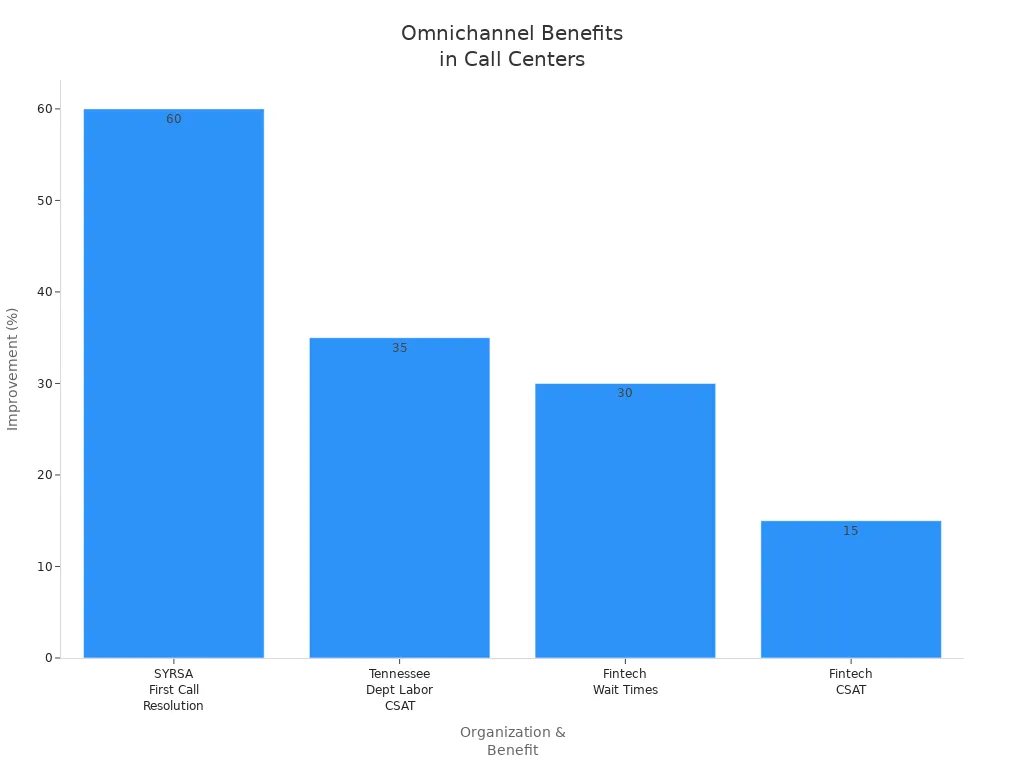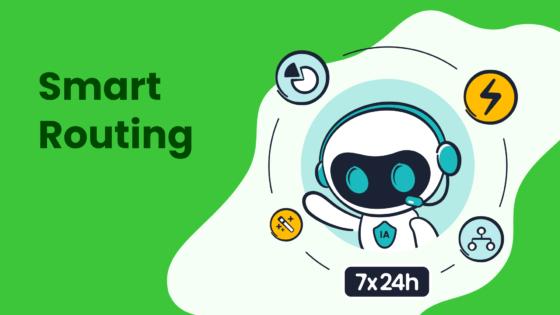How Technology Is Transforming the Future of Call Centers

Technology is reshaping the future of call centers at an unprecedented pace. The global call center market, valued at $340 billion in 2020, is set to reach nearly $500 billion by 2027, driven by rising customer expectations and the demand for immediate, personalized service [source]. Companies that embrace digital-first strategies, such as Sobot AI, gain a clear advantage. Sobot leads with innovative solutions that use automation and AI to help businesses adapt to the future. Sobot call center technology enables hybrid remote work, boosts agent productivity, and supports secure operations. These advancements mark a new era, making the future of call centers more efficient, scalable, and customer-centric.
Technology Trends
The landscape of call center technology continues to evolve rapidly, driven by a combination of emerging trends and customer expectations. Businesses that keep pace with these changes gain a competitive edge in delivering superior customer experiences. The following analysis explores the most significant contact center technology trends shaping the industry in 2025.
AI and Automation
Artificial intelligence and automation stand at the forefront of call center technology. These innovations transform how agents interact with customers and manage daily tasks. AI-powered systems automate routine inquiries, freeing agents to focus on complex issues. Automation tools such as robotic process automation (RPA) streamline repetitive, rule-based tasks, reducing operational costs and improving efficiency.
AI-driven scoring evaluates customer interactions and agent performance, while real-time guidance tools boost productivity and service quality. Nearly 40% of organizations now use AI to assess interactions, and 46% employ AI-powered support during live calls.
Generative AI and conversational AI add empathy and autonomous reasoning to customer conversations. These technologies listen to calls, provide suggestions, and help agents resolve issues faster. Sobot’s Voice/Call Center leverages AI-powered Voicebot and intelligent IVR to automate call routing and handle inquiries efficiently. The platform’s unified workspace allows agents to manage calls and customer information seamlessly, enhancing both agent experience and customer satisfaction.
Key AI and Automation Technologies:
- Robotic Process Automation (RPA): Automates repetitive tasks, streamlining operations.
- Interactive Voice Response (IVR): Routes calls and provides automated responses.
- Natural Language Processing (NLP): Enables chatbots and voice assistants to understand customer language.
- Automatic Speech Recognition (ASR): Converts speech to text for voice-driven interactions.
- Predictive Call Routing: Matches customers with the best-suited agents using machine learning.
Gartner predicts conversational AI will reduce agent labor costs by $80 billion by 2026 and automate one in ten customer interactions. Sobot’s strategic AI initiative, the Five-AI system, integrates omnichannel AI, scenario-based AI, and generative AI to deliver intelligent, secure, and scalable solutions for global brands.
Omnichannel Platforms
Omnichannel platforms represent a renewed focus on omnichannel customer engagement. These systems integrate multiple communication channels—voice, chat, email, SMS, and social media—into a unified experience. Agents access complete customer histories in real time, reducing average handle time and improving first call resolution rates.
Omnichannel support enables customers to switch channels without losing context, which 86% of consumers expect. Sobot’s Omnichannel Solution provides a comprehensive platform for managing interactions across all channels. The solution’s unified workspace consolidates customer data, allowing agents to deliver personalized and efficient service. AI-driven chatbots resolve 60–70% of repetitive queries, while voicebots handle up to 90% of interactions without human escalation.
| Organization | Measurable Benefit | Metric/Result |
|---|---|---|
| SYRSA (Spanish automotive group) | Increase in First Call Resolution | 60% increase |
| SYRSA | Improved Customer Satisfaction | Not quantified specifically |
| Tennessee Department of Labor | Increase in Customer Satisfaction | 35% increase in CSAT |
| Tennessee Department of Labor | Reduction in Response Times | Significant reduction (not quantified) |
| Fintech company (example) | Reduction in Average Wait Times | 30% reduction |
| Fintech company (example) | Increase in Customer Satisfaction | 15% boost in CSAT |

Sobot’s platform supports global brands, integrating e-commerce, social media, apps, emails, and SMS into a single contact center. This approach drives higher customer satisfaction scores, stronger loyalty, and measurable ROI.
Cloud Solutions
Cloud contact centers have become a cornerstone of modern call center technology. Cloud-based platforms offer flexibility, scalability, and reliability, supporting hybrid and remote workforces. The cloud market is projected to grow from $23 billion in 2022 to $120 billion by 2032, reflecting the shift toward cloud-based contact centers.
Cloud-based contact centers enable rapid onboarding and remote access, allowing businesses to scale operations without investing in new hardware. Sobot’s Cloud Call Center provides global number availability, high system uptime (99.99%), and seamless integration with CRM systems. The platform’s mobile compatibility supports agents working from anywhere, improving employee satisfaction and retention.
Advantages of Cloud-Based Platforms:
- Enhanced flexibility and scalability
- Cost savings and operational efficiency
- Improved customer experience with omnichannel support
- Faster deployment and easier management
- Built-in business continuity and disaster recovery
- Remote-ready and future-proof
- Security and compliance at scale
Research shows that remote workers in cloud contact centers have a retention rate of 80%, compared to only 25% for on-premise agents. Sobot’s global network spans 110 points of presence in 93 cities across 50 countries, ensuring reliable operations for businesses worldwide.
Analytics
Analytics play a vital role in driving decision-making and performance improvements in call centers. Advanced analytics technologies such as AI, natural language processing, and speech analytics analyze large volumes of customer interactions. These tools uncover customer sentiment, agent performance insights, and operational trends.
Predictive analytics use historical data to forecast call volumes, staffing needs, and customer behavior. Interaction analytics leverage AI and machine learning to identify recurring problems and improve first call resolution rates. Cross-channel analytics integrate data from multiple communication channels, providing a comprehensive view of customer behavior.
Speech analytics transform raw audio into actionable insights, identifying customer emotions, recurring issues, and script effectiveness. The speech analytics market is projected to grow at a 15.61% CAGR through 2029, highlighting its increasing importance in call center technology.
Sobot’s Voice/Call Center offers real-time monitoring and analysis of call data, enabling businesses to optimize workforce scheduling, call routing, and agent coaching. The platform’s data analytics capabilities support continuous improvement and personalized customer service.
Security
Security remains a top priority for call centers, especially as operations expand across multiple systems and jurisdictions. Protecting sensitive customer data and ensuring compliance with regulations such as GDPR, HIPAA, and PCI-DSS are critical challenges. Call centers face risks from insider threats, data breaches, and cross-border data transfers.
Technical safeguards include firewalls, intrusion detection systems, end-to-end encryption, role-based access controls, and multifactor authentication. Administrative measures such as security training, regular audits, and incident response protocols further strengthen defenses.
Outsourced call centers require thorough vendor assessments, focusing on cybersecurity frameworks, encryption protocols, and security governance. Implementing strong encryption (e.g., AES-256), anonymization techniques, and continuous monitoring helps mitigate risks.
Sobot’s Secure AI initiative ensures data privacy and compliance for global brands. The platform’s encrypted data transfer and secure communication channels build customer trust and protect business reputation.
Sobot’s Achievements and Global Network
Sobot stands out as a leader in call center technology. The company is officially recognized as a WhatsApp Business Solution Provider (BSP), offering WhatsApp Business API for consumer engagement and support. Sobot serves over 10,000 global brands, integrating multiple communication channels into a unified contact center. The platform’s strategic AI initiative, Five-AI, delivers omnichannel AI, scenario-based AI, multi-faceted AI, generative AI, and secure AI.
Sobot’s global network supports voice inbound and outbound services with global phone numbers and APIs. Trusted by major enterprises such as Samsung, OPPO, and OnePlus, Sobot demonstrates market leadership in delivering efficient, scalable, and secure contact center solutions.
The Future of Contact Center Technology Trends
The future of call center technology will be shaped by continued advancements in artificial intelligence, automation, cloud-based platforms, and omnichannel customer engagement. Businesses that embrace these emerging trends will deliver superior customer experiences, optimize operations, and achieve measurable business outcomes. Sobot’s innovative solutions exemplify the power of integrating AI, automation, cloud, and omnichannel support to meet the evolving needs of global enterprises.
Future of Call Centers

The future of call centers is unfolding rapidly as technology transforms every aspect of customer service. Companies now rely on advanced solutions to improve agent roles, enhance customer experience, and drive business outcomes. Sobot stands at the forefront, offering AI-powered platforms that support global brands in their journey toward workforce optimization and operational excellence.
Agent Experience
Call center agents play a vital role in shaping the future of customer service. Technology now empowers agents with real-time agent assistance, centralized knowledge management, and integrated CRM systems. These tools reduce search time, improve first call resolution, and enable agents to deliver personalized support.
- Knowledge management systems centralize information, allowing agents to resolve issues faster.
- CRM platforms organize customer data, supporting tailored service.
- Automation tools, such as IVR and predictive dialers, streamline workflows and reduce operational costs.
- Call analytics and quality monitoring help agents maintain high service standards.
- Integration of multiple technologies enables agents to provide effective, personalized support.
AI automates routine tasks, freeing agents to focus on complex problem-solving and proactive customer success. Real-time analytics empower agents to personalize interactions and anticipate customer needs. Omnichannel AI tools allow agents to maintain seamless context across platforms, improving customer experience. Agents now evolve into specialized roles, such as AI supervisors and customer success partners. New skills include emotional intelligence, adaptive communication, and technology management.
By 2028, 68% of customer service interactions will be handled by agentic AI, according to industry forecasts. Most professionals believe this shift enables more personalized, proactive, and predictive services.
Sobot’s unified workspace provides agents with all the tools they need for efficient customer service. The platform’s AI-powered Voicebot and real-time agent assistance features help agents resolve issues quickly and accurately. Sobot’s mobile compatibility allows agents to work from anywhere, supporting hybrid and remote teams.
Key factors driving improvements in agent experience:
- Agents receive the right tools and support resources, increasing productivity and job satisfaction.
- Comprehensive training prepares agents to handle their roles effectively, reducing errors and boosting confidence.
- User-friendly, integrated technology reduces time spent on administrative tasks, enabling agents to focus on complex issues.
- Positive agent experience improves customer service quality, resulting in higher customer satisfaction and loyalty.
- Investing in agent experience helps attract and retain top talent, creating a supportive work environment.
Agents now shift from reactive problem solvers to proactive contributors who enhance customer satisfaction and business value. AI supports predictive models that help agents identify and resolve issues before customers raise complaints. Human agents remain essential for emotional intelligence, complex decision-making, and relationship-building, with AI augmenting their capabilities.
Customer Experience
Customer experience defines the future of call centers. Technology adoption leads to higher satisfaction scores, improved loyalty, and measurable business outcomes. Integration of AI and robotics automates routine tasks and personalizes customer interactions, enhancing customer experience. Predictive voice analytics help maintain consistent quality by analyzing agent tone and pitch, leading to improved customer return rates.
Efficient customer routing reduces wait times and increases first-call resolution, directly boosting customer satisfaction. Centralized data and cloud-based solutions provide quick access to customer information, enabling personalized and efficient service. AI-powered chatbots and omnichannel experiences create seamless, personalized support, which is linked to higher customer satisfaction and loyalty.
Real-time sentiment analysis detects customer emotions during calls, enabling immediate intervention and improving customer experience. Predictive analytics improve staffing accuracy and agent training, reducing wait times and enhancing first contact resolution.
Sobot’s Omnichannel Solution integrates multiple communication channels, allowing agents to access comprehensive customer journey data. This reduces repeat calls and customer effort. Real-time agent assistance features empower agents to personalize interactions, boosting CSAT, CES, and NPS scores. Advanced analytics connect customer experience metrics directly to business outcomes, such as revenue impact and customer loyalty.
Empirical research on a large telecom operator’s call center in China shows that introducing AI-based conversational agents improves operational performance by automating routine customer interactions. This reduces human labor costs and enhances efficiency, which indirectly supports higher customer satisfaction by enabling faster and more consistent service. The AI agent’s optimized voice and interactive capabilities engage customers effectively, contributing to improved service quality and customer experience.
Sobot’s Customer Story: OPPO
OPPO, a global leader in smart devices, partnered with Sobot to transform its customer service operations. During peak shopping periods, OPPO faced a surge in customer inquiries. Sobot’s chatbot and ticketing system enabled OPPO to handle repetitive queries with automation, freeing human agents for complex issues. Sobot optimized OPPO’s knowledge base, reducing maintenance efforts by 90%. Integration of global customer channels and business systems improved data accessibility and customer satisfaction.
| Metric | Before Sobot | After Sobot Implementation |
|---|---|---|
| Chatbot Resolution Rate | 45% | 83% |
| Positive Feedback Rate | 70% | 94% |
| Repurchase Rate | 36% | 57% |
OPPO achieved an 83% chatbot resolution rate, a 94% positive feedback rate, and a 57% increase in repurchase rate. Sobot’s solutions streamlined operations, reduced agent workload, and improved customer experience. OPPO’s management highlighted the positive impact on customer satisfaction and the substantial increase in repurchase rates as key benefits.
Operational Efficiency
Operational efficiency drives the future of call centers. Automation and AI technologies streamline workflows, reduce manual tasks, and optimize resource allocation. AI-powered chatbots and virtual assistants handle routine inquiries 24/7, reducing wait times and freeing agents for complex tasks. Intelligent call routing analyzes caller intent and context to connect customers to the best agent, improving resolution speed and reducing transfers.
Advanced call center solutions enable continuous, automated tracking of KPIs in real time, capturing nuanced customer sentiment and effort. AI-driven insights prompt agents with contextual advice during calls, improving resolution rates and reducing customer effort. Automated workflows reduce manual tasks, allowing agents to focus on quality interactions. Managers benefit from automated coaching tools that highlight script compliance and training needs, leading to improved agent performance and better customer experience outcomes.
| Operational Efficiency Gain | Description / Impact |
|---|---|
| Decreased Handle Time | Reduced by 20%, leading to significant cost savings |
| Increased First Call Resolution (FCR) | AI directs customers to right solution, reducing repeat calls and transfers |
| Reduced Agent Turnover | Lowered by 15%, saving costs and improving workforce stability |
| Elimination of Manual After-Call Tasks | AI automates call summaries and CRM updates, saving agent time |
| Reduced Call Hold Times | AI call routing connects callers faster, improving experience |
| 24/7 Support Without Extra Staffing | AI voicebots and IVRs provide continuous service without additional agents |
| Reduced Human Errors | AI pulls data directly, minimizing typos and errors |
| Improved Agent Focus and Job Satisfaction | Agents handle complex cases, reducing burnout and increasing engagement |
Sobot’s Voice/Call Center offers real-time agent assistance, intelligent IVR, and unified workspace features that support workforce optimization and operational efficiency. The platform’s global network and high system uptime ensure reliable operations for businesses of all sizes. Sobot’s analytics capabilities help managers optimize workforce scheduling, call routing, and agent coaching.
AI-powered chatbots and virtual assistants handle routine inquiries, reducing wait times and freeing agents for complex tasks. Intelligent call routing analyzes caller intent and context, connecting customers to the best agent and improving resolution speed. AI tools like real-time sentiment analysis and automated call summaries streamline agent workflows and reduce manual tasks. Generative AI assists agents with real-time response suggestions and automates call documentation, boosting productivity and accuracy.
The future of call centers depends on continuous optimization, workforce optimization, and the adoption of advanced technology. Companies that invest in AI, automation, and omnichannel solutions will achieve higher customer satisfaction, improved agent experience, and greater operational efficiency.
The future of call centers will be defined by real-time agent assistance, seamless customer experience, and workforce optimization. Sobot’s innovative solutions exemplify how technology can drive business success and transform customer service for global enterprises.
Contact Center Technology Trends
Contact center technology trends continue to shape the future of customer service. Companies now focus on delivering more personalized, efficient, and flexible experiences. The following table highlights the most prominent trends currently transforming the industry:
| Contact Center Technology Trend | Description and Impact |
|---|---|
| Artificial Intelligence (AI) & Automation | Use of chatbots, virtual assistants, NLP, and speech analytics to handle routine inquiries, improve customer interactions, and reduce costs. |
| Cloud Migration | Adoption of cloud-based platforms enabling scalability, remote work, and flexibility to adapt quickly to demand changes. |
| Social Media Integration | Incorporation of social media channels to meet customer expectations for rapid responses and manage customer sentiment. |
| Omnichannel Solutions | Unified communication channels (phone, email, chat, social media) providing seamless, consistent, and personalized customer experiences. |
| Core Technologies (VoIP, IVR, ACD) | Foundational tools that streamline operations, reduce costs, and improve call routing and handling efficiency. |
| Advanced Workforce Management & Quality Assurance | Tools for scheduling, real-time monitoring, performance feedback, and continuous improvement to maintain high service standards. |
These trends drive optimization, agent productivity, and customer satisfaction across the industry.
Personalization
Personalization stands out as a key trend in contact center technology. Companies use data and AI to tailor every interaction to the customer’s needs. This approach increases satisfaction and loyalty. Personalized experiences make customers feel valued and understood. For example, Netflix and Spotify use advanced personalization to keep users engaged and loyal.
- Personalization makes interactions more relevant, increasing positive experiences and loyalty.
- It encourages deeper engagement, such as repeat purchases and participation in loyalty programs.
- Stronger emotional connections build trust and reduce customer churn.
- Personalized recommendations lead to higher Customer Lifetime Value.
- Satisfied customers often become brand advocates, driving retention through word-of-mouth.
Sobot’s unified workspace helps agents access customer data instantly, allowing them to deliver tailored service. Real-time agent assistance tools suggest the best responses, making each conversation unique. Companies that invest in personalization see higher retention and stronger customer relationships.
AI-Powered Assistance
AI-powered assistance has become essential in modern contact centers. AI agents handle routine questions 24/7, reducing wait times and improving efficiency. Real-time agent assistance provides live coaching and feedback, helping agents perform better. Dashboards and reporting tools track performance and support continuous optimization.
94% of contact center leaders use AI for self-service, and 96% use it for live support. These tools improve response times, increase customer satisfaction, and reduce escalation rates. AI-powered Voicebots, like those in Sobot’s Voice/Call Center, automate call routing and provide instant answers. Real-time agent assistance helps agents resolve complex issues quickly, leading to measurable ROI and better customer service outcomes.
- Improved response times
- Increased customer satisfaction
- Reduced escalation rates
- Enhanced operational efficiency
- Measurable ROI
Companies that use AI-powered assistance see faster, more personalized interactions and less agent burnout.
Remote Work
The new wave of work has changed how contact centers operate. Remote work enables flexibility and access to a wider talent pool. Cloud-based platforms support agents working from anywhere, using secure connections and mobile devices. Sobot’s mobile compatibility ensures agents stay productive on Android and iOS devices.
Studies show that onsite workers report higher satisfaction than remote workers, especially regarding job nature and supervisor support. However, remote agents value autonomy and flexibility. Organizational support, training, and the right technology help remote teams succeed. Real-time agent assistance and unified workspaces keep remote agents connected and effective.
Remote work, supported by cloud migration and mobile tools, allows contact centers to adapt quickly to changing demands. This trend supports business continuity and workforce optimization, making customer service more resilient and scalable.
Contact center technology trends like personalization, AI-powered assistance, and remote work enable companies to deliver better customer service, drive optimization, and stay ahead in a competitive market.
Call Center Technology Solutions

Sobot Voice/Call Center
Sobot Voice/Call Center stands out in the call center technology landscape. The platform integrates omnichannel AI, supporting chat, email, voice (inbound and outbound), social platforms, and SMS. This approach ensures a seamless customer experience across all channels. Sobot’s scenario-based AI adapts to industries like e-commerce and retail, guiding customers from pre-sales to post-sales. The system features multi-faceted AI roles, including AI Agent for automated service, AI Copilot for agent assistance, and AI Insight for analytics. Generative AI uses advanced Large Language Models, such as OpenAI and Amazon Bedrock, to deliver accurate responses. Secure AI protects global data privacy and meets compliance standards. Voicebot capabilities handle over half of inbound calls independently, using real-time speech recognition and human-like voice. Outbound voicebots boost sales by more than 30%. Sobot’s core technologies—ASR, NLP, LLM, and TTS—ensure reliable performance. With over a decade of experience, Sobot provides a mature and trusted call center technology solution.
Omnichannel Integration
Omnichannel integration improves the consistency and quality of customer interactions. Sobot’s platform centralizes communication management, reducing errors and increasing operational efficiency. Agents access a unified view of customer data and interaction history, which prevents customers from repeating information. The system standardizes messaging and tone, ensuring consistent service quality. AI-powered intelligent routing connects customers to the right agent quickly, improving first-call resolution rates. Real-time insights from digital activity help agents personalize each interaction. Automation tools reduce agent workload, allowing focus on complex issues. This unified approach enhances customer satisfaction, agent performance, and brand loyalty.
Workflow Automation
Workflow automation transforms call center technology by streamlining operations and improving accuracy. Automated processes reduce human errors and ensure consistent execution of tasks. The table below highlights key benefits:
| Benefit | Description | Impact on Call Centers |
|---|---|---|
| Error Reduction | Repeats steps accurately | Improves data entry and request handling |
| Real-Time Data & Analytics | Immediate updates and dashboards | Enables instant performance monitoring |
| Cost Savings | Cuts manual labor and overtime | Lowers operational expenses |
| Scalability | Handles increased workload without extra staff | Supports growth efficiently |
| Better Customer Experience | Faster, accurate service | Increases satisfaction and loyalty |
Automation tools enable quick approvals, enhance collaboration, and provide real-time visibility into workflow progress. Sobot’s workflow automation supports ticket management and escalation, improving response times and compliance. These features help call centers deliver faster, more reliable service while adapting to changing business needs.
Artificial Intelligence in Call Centers

Artificial intelligence is transforming call centers by making customer interactions smarter and more efficient. Companies now use advanced AI tools to improve service quality, boost agent performance, and ensure compliance. Sobot’s AI-powered chatbot, Voicebot, and analytics capabilities help businesses deliver seamless support across every chat channel.
Conversational AI
Conversational AI changes how customers and agents communicate. AI virtual assistants handle routine chat and voice inquiries, reducing the need for human intervention. These systems use natural language understanding to answer questions, guide customers, and resolve issues quickly. Sobot’s AI virtual assistants automate up to 70% of routine inquiries, cutting service costs and improving first-call resolution rates. Real-time agent assist tools provide suggestions and customer history during live chat, helping agents respond faster and more accurately. Advanced call routing connects customers to the right agent, minimizing transfers and reducing call handling times. Interaction analytics powered by artificial intelligence identify recurring issues, allowing continuous improvement in chat and voice support.
Speech Analytics
Speech analytics plays a key role in ai-powered quality assurance. This technology monitors every call and chat in real time, ensuring agents follow scripts and meet regulatory requirements. Sobot’s analytics platform reviews conversations for compliance, flags sensitive information, and provides immediate feedback to agents. In regulated industries, speech analytics reduces the risk of costly violations by automatically detecting non-compliant language. Managers receive objective scorecards after each call, enabling on-the-spot coaching and performance improvement. Automated records support compliance reporting, making quality assurance more consistent and efficient.
Generative AI
Generative AI brings a new level of intelligence to call centers. It acts as an intelligent copilot, suggesting responses, summarizing chat history, and recommending next steps during live interactions. Sobot’s generative AI personalizes customer conversations by using data from previous chats, creating more engaging and relevant experiences. Routine tasks like after-call summaries and documentation are automated, reducing agent workload and improving efficiency. AI-powered quality assurance benefits from 100% conversation monitoring, personalized coaching, and real-time compliance checks. Generative AI also supports multilingual chat, helping agents serve diverse customers and maintain high service standards.
Artificial intelligence, through ai-powered quality assurance and advanced chat solutions, enables call centers to deliver faster, more accurate, and personalized service. Sobot’s AI tools empower agents, enhance customer satisfaction, and drive operational excellence.
Contact center technology trends are reshaping the industry. AI adoption is rising, with 62% of organizations using it to automate tasks and improve efficiency. Generative AI, cloud migration, and omnichannel platforms drive better customer and agent experiences. Sobot leads by combining emotional intelligence with automation, helping brands deliver personalized service and reduce costs.
To evaluate new call center technology, leaders should:
- Invest in scalable cloud-based solutions.
- Use AI-powered analytics for real-time insights.
- Ensure strong data security and compliance.
- Choose partners with proven industry experience.
The future of call centers will depend on staying agile and embracing innovation as technology continues to evolve.
FAQ
What is call center technology and why is it important?
Call center technology includes tools and systems that help businesses manage customer calls and messages. Companies use these solutions to improve service, reduce costs, and boost satisfaction. Sobot’s AI-powered platform shows how modern call center technology can transform customer support.
How does AI improve contact center technology trends?
AI automates routine tasks, analyzes conversations, and provides real-time help to agents. For example, Sobot’s Voicebot can answer common questions and route calls. This use of AI in contact center technology trends increases efficiency and helps agents focus on complex issues.
What are the benefits of automation in call center technology?
Automation speeds up workflows, reduces errors, and lowers costs. Sobot’s workflow automation handles ticket management and call routing. Companies using automation in call center technology report faster response times and higher customer satisfaction.
How does Sobot support omnichannel customer service?
Sobot’s omnichannel solution connects voice, chat, email, and social media in one platform. Agents see all customer interactions in a unified workspace. This approach ensures customers get consistent service, no matter which channel they use.
Is Sobot’s call center technology secure and reliable?
Sobot provides encrypted data transfer and a 99.99% system uptime. The platform supports global brands and meets strict security standards. Businesses trust Sobot’s call center technology to protect customer information and deliver stable service worldwide.
For more details about Sobot’s solutions, visit the official website.
See Also
Understanding The Efficient Functioning Of Call Center Automation
Comprehensive Guide To Omnichannel Software For Call Centers
Best Contact Center Solutions Evaluated For The Year 2024
